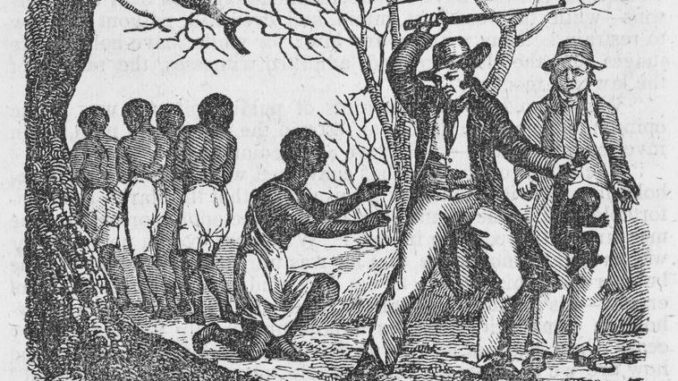
Editor’s Note: The author offers their perspective on American Exceptionalism in this essay.
In a chapter he wrote titled “Exceptionalism,”1 historian Daniel T. Rodgers argues American Exceptionalism is a historically contrived myth. The book in which the chapter appears is Imagined Histories: American Historians Interpret the Past (1998, edited by Anthony Molho and Gordon S. Wood). Rodgers discusses the origins and evolution of the historicism that undergirds the embedded structural creed that says the United States stands alone as inimitable among nations. Historicism is the theory that history determines social and cultural phenomena.
Within U.S. social movements, American Exceptionalism increasingly has been used to explain the ideology that guides U.S. interventions around the world and against domestic colonized populations, such as African and Indigenous peoples. This essay seeks to examine the roots of this ideological framework.
Historian Frederick Jackson Turner first struck an exceptionalist chord in his 1893 essay, “The Frontier in American History,” with his “perennial rebirth” or “rebaptized as an American”2 theme that proclaimed a singular “American” character. This came about by rejecting the European ethos and replacing it with a unique pioneering spirit exclusive to the “American.” Within was a detailed examination of the dialectical shifts of American historiography, philosophy and religion that pulsed through the “American” experience: From the earliest origins of the pious fundamentalism of the Massachusetts Bay Colony to the American Revolution, World War II, the Cold War and its current role as a global hegemonic superpower, Rodgers demystifies and untangles the “skein of tropes”3 that underpin the “newness” and “distinctiveness” that defines United States’ historical, social and political “uniqueness.”4 Rodgers ignites his chapter with a question: Is the United States different? Then, through the use of scholarly and authoritative evidence, he methodically proceeds to lay bare the mythological foundations that buttress the United States’ fabled white-supremacist history, analyzing and exposing an unexceptional exceptionalism at its core, for all to see. Yet, in spite of his and other scholars’ well researched conclusions, Rodgers ends his chapter by exposing the persistent and entrenched depths of the American exceptionalist archetype, writing, “Michael McGerr and Michael Kammen demonstrate [that within modern American historicism] challenges to the exceptionalist paradigm [still] generate sharp, visceral reactions.”5
Rodgers, unswayed by post-1950s acculturation, looks back through time critically scouring the metahistorical chronicle in search of the decisive epochs that contributed most to the phenomenon called American “exceptionalism.” His contribution is considered a seminal work in contemporary and post-exceptionalist historiography. Literary critic and academic Donald Pease writes, “Daniel T. Rodgers, perhaps the most articulate of a growing cadre of post-exceptionalist U.S. historians, has formulated the rationale for this collective endeavor with eminent clarity.”6 Rodgers proclaims the United States’ build-up and victory in WWII, its rise to global supremacy and its dominance throughout the Cold War are central to decoding the portent of American Exceptionalism.
Contemporary scholars concur. “I agree that World War II set up an important phase in the history of American exceptionalism,”7 states Ian Tyrell. Rodgers and his post- exceptionalist colleagues (through primary and secondary source material) expose past and present historiography by turning it on its head. Laurence Veysey points out, “It is clear that earlier interpretations of American history and culture, aggressively put forth as recently as the 1950s and emphasizing ‘uniquely’ American experiences and habits of mind, served largely to mislead us.”8 Eric Rauchway pushes even further by stating, “The concept of American exceptionalism does not really have anything to do with actual history,”9 meaning that, in-depth analysis of the historical record reveals quite a different story.
Rodgers points to another specious characteristic of exceptionalist historicism. That being the claim that providential intervention and the United States’ cultural preeminence are guided, if not driven, by God, which defines the nation’s “difference.” Rodgers explains, “…difference in American national culture has meant ‘better’: The superiority of the American way.”10 He argues how unexceptional the United States is in this regard. “Pride and providentialism are too widely spread to imagine them American peculiarities.”11 According to Rodgers, the dissemination of American Exceptionalism, in the mid-20th century, was undergirded by a political, philosophical and psychological propaganda campaign: A deep rivalry with the former USSR that led the United States to co-opt and invert a Stalinist neologism of the 1920s (i.e., Soviet “exceptionalism”) and plant it firmly and inextricably, in its “divine” and rightful place: The United States of America! Yet, he queries even further: “What was the historiographical past of that conceit?”12
Rodgers traces the historiography back to an 18th-century travel writer, J. Hector St. John de Crévecoeur, who first described the Europeans [i.e., white males] inhabiting North America as unique and distinctive. Crévecoeur posed an essentialist question, “What is an American?”13 Rodgers demonstrates Crévecoeur was, “virtually unread in the United States before the twentieth century [his] lyric passage on … [the] ‘melting’ of persons of all [European] nations into ‘a new race of men’ [was] extracted from context … which now seemed to appear everywhere.” That was co-opted and retitled, “What Is the American, This New Man?” by “Arthur Schlesinger, Sr., [U.S. historian who] made it the motif of his presidential address to the American Historical Association in 1942.”14 Rodgers asserts, “The literature of the new American Studies movement [from then on] was saturated with Crévecoeur references.”15 He continues, “They led off that catalyst of revisionist histories … [including] Robert E. Brown’s Middle-Class Democracy and the Revolution in Massachusetts, in 1955.”16 The United States was considered from that point on, in and out of the academy, a uniquely singular phenomenon in world history.
Rodgers exposes an irony. “…In their anti-Marxism, they reimagined Marx’s general laws of historical motion applied everywhere but to their own national case.”17 Meaning, “John Winthrop’s ‘city upon a hill’ … was no longer a mid-Atlantic hope … it was now America itself.”18
Until the most recent shockwaves of the U.S. empire felt externally, and internally, in the forms of a 20-year-long Afghan debacle, endless wars for profit, brutal domestic police abuse (which disproportionately kills people of color), a permanent war on the poor and a healthcare system that ruthlessly places profits above life, the American Exceptionalism myth woven throughout U.S. history was fixed. But now, the mask has fallen for all the world to see.
Stephen Joseph Scott is an essayist associated with The University of Edinburgh’s School of History. He is a singer/songwriter, humanist/activist, a self-taught musician and performer. As a musician, Scott uses American Roots Music to illustrate the U.S. social and political landscape. His latest video is “We Know They Lied.”
1 Daniel T. Rodgers, “Exceptionalism,” in Imagined Histories: American Historians Interpret the Past, ed. Anthony
Molho and Gordon S. Wood (Princeton, N.J: Princeton University Press, 1998), 21–40.
2 Ibid., 25.
3 Ibid., 22.
4 Ibid.
5 Ibid., 35.
6 Donald Pease, “American Studies after American Exceptionalism?” in Globalizing American Studies (University of
Chicago Press, 2010), at https://chicago-universitypressscholarship-
com.ezproxy.is.ed.ac.uk/view/10.7208/chicago/9780226185088.001.0001/upso-9780226185064-chapter-2
7 Ian Tyrrell and Eric Rauchway, “The Debate Table: Eric Rauchway and Ian Tyrrell Discuss American
Exceptionalism,” Modern American History 1 (2018): 247–256.
8 Laurence Veysey, “The Autonomy of American History Reconsidered,” American Quarterly 31, no. 4 (1979): 455.
9 Tyrrell and Rauchway, “Debate Table.”
10 Rodgers, “Exceptionalism,” 22.
11 Ibid.
12 Ibid., 21.
13 Ibid., 37.
14 Ibid., 27.
15 Ibid.
16 Ibid.
17 Ibid., 29.
18 Ibid., 27.












